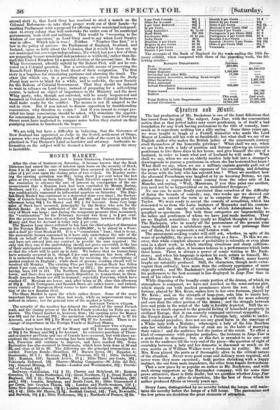COnfrts anti 3/1Kitif.
The last production of Buekstone is one of the least felicitous that
has issued from his pen. The subject, Leap-Year, with the concomitant notion that at that period ladies may court gentlemen, is of itself a bad foundation for any work having pretensions to the title of comedy, inas- much as it repre&nts nothing but a silly saying. Some three years ago, we were taught to laugh at a French dramatist who made the Lord Mayor of London sell his wife at Smithfield; but what shall we say of an English author who makes the British ladies of the nineteenth century avail themselves of the bissextile privilege? What shell we say, when we see in his work a lady of position and fortune allowing an eccentric gentleman to live three days in her house, and give himself the airs of a husband, in order to learn what sort of husband he will make ? What shall we say, when we see an elderly maiden lady bolt into a stranger's dmwingror to pursue a gentleman on whom she has bestowed her heart ? What 41.2 we say, when we see a military captain gravely pull out of his pocket a bill setting forth the expenses of his courtship, and debating the items with the lady who has rejected him ? When we recollect how the aforesaid Frenchman was laughed at by us knowing Britons, we can almost fancy a reproachful voice coming from the other side of La Manche, and saying, " Well, Messieurs, if you thus paint one another, you need not be so hypercritical on us, uninitiated foreigners." No one can be more firmly convinced than ourselves of the difficulty of fixing the bounds of comedy; nay, two weeks ago we showed our willingness to extend the term so as to comprise the Diogenes of Mr. Taylor. We were ready to accept the comedy of actualities, which has descended to us from the Latin imitators of Menander and his contem- poraries, and the comedy of symbols, of which Aristophanes has be- queathed us specimens. But both these categories are impenetrable to ladies and gentlemen of whom we have just made mention. They are no English actualities; they typify no English thoughts or feelings. The Harlequin, who in nearly all the pantomimes of the present year turns Smithfield into a salubrious spot, is a more real personage than- any of them, for he represents a real London wish. The amusement-seeking reader will still ask, whether, in spite of its. want of probability, the piece is not diverting as a farce. To this we an- swer, that while complete absence of probability is tolerable or even pleas sant in a short work, in which startling situations and sharp collision- rapidly follow each other, it becomes tedious in a performance which lasts three hours. There is always a power of comic writing in Mr. Buck- stone ; and when his language is spoken by such artists as himself; Mr. and Mrs. Keeley, Mrs. Fitzvrilliam and Mrs. W. Clifford, many hearty- laughs are naturally produced. Still, the characters, though more extra- vagant than ordinary, have more than the ordinary appearance of mere stage growth ; and Mr. Buckstone's justly celebrated quality of turning his performers to the best account is less displayed in leap-Year than in most of his other works. While disposing of the broadly comic portion of the drama, of which its atmosphere is composed, we have not touched on the semi-serious plot, which stands out with marked prominence above the rest. A lady of fortune, played by Mrs. Kean, makes love to her own footman, played by Mr. Kean; and, on the strength of leap-year, asks him to many her. The strange position of this couple is managed with far more sobriety and care than the other portion of the drama; and the struggle between love and pride in the mind of the lady is forcibly depicted. Still the re- lation is so muchopposed to the general feeling of household propriety in civilized Europe, that it can scarcely command universal sympathy. In the French drama of le Doeteur Noir, a Parisian lady, unable to under- stand colonial prejudice, does not see any gm( harm in the marriage of a White lady with a Mulatto ; whereupon a lady of the Isle Bourbon asks her whether in Paris ladies of rank are in the habit of marrying their valets ? and the audience feel the justice of the retort. To effect a kind of compromise with popular prejudice, the footman in Leap-Year is a gentleman in disguise; but, as this fact is revealed to no one—not even to the audience till the very end of the piece—the question of right of courtship between a lady and her domestic is discussed as much on its own merits as if William Walker were a footman in reality. Mr. and Mrs. Kean played the parts as if thoroughly alive to the critical nature of the situation. Never were good sense and delicacy more required, and never were they more exercised ; both parties shrinking with a happy instinct, the one from male impudence, the other from female forwardness. That a new piece by so popular an author as Mr. Buckstone, and with such strong supporters as the Haymarket company, will for some time prove attractive, there is little doubt; but we question whether „Leap- Year will ever become a piece de repertoire, like the best of those which its author produced fifteen or twenty years ago.


























 Previous page
Previous page